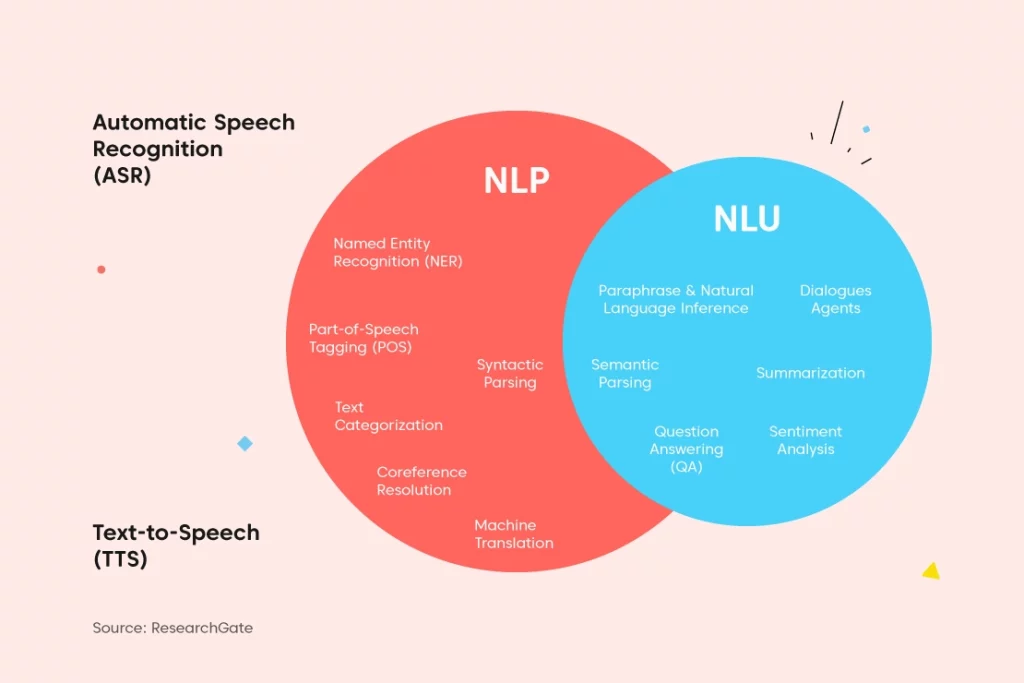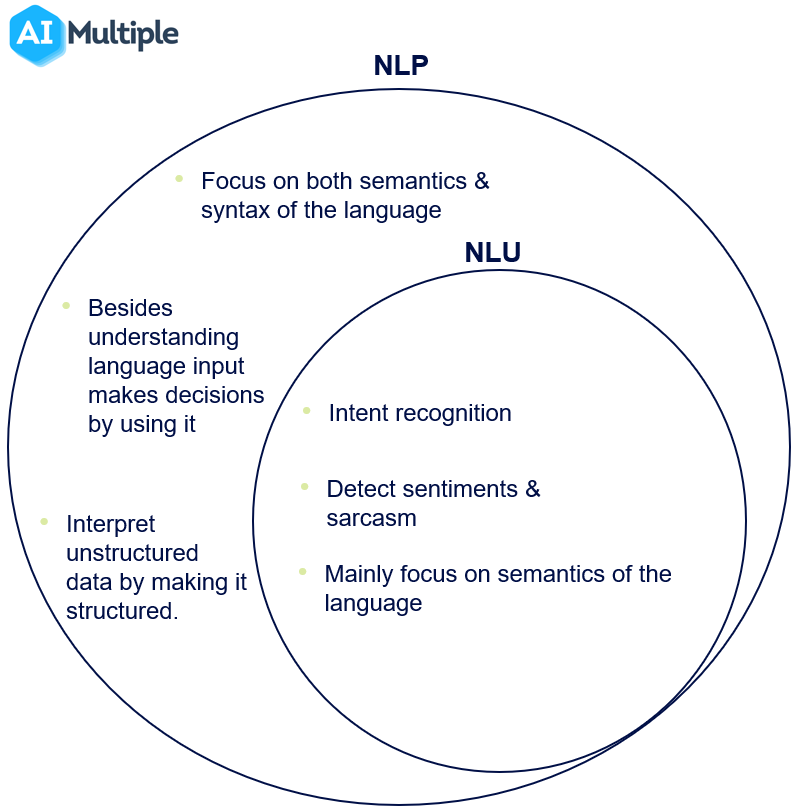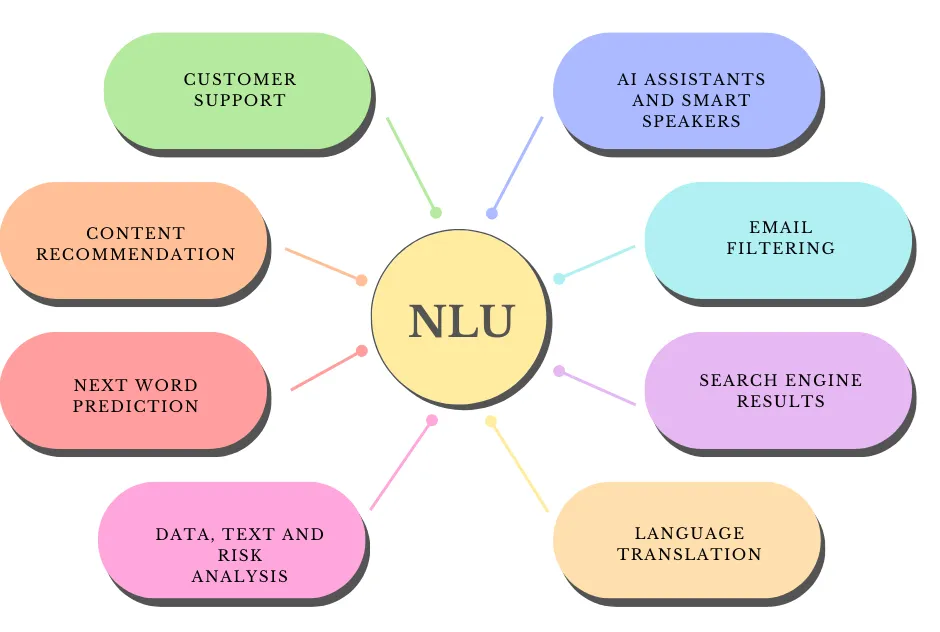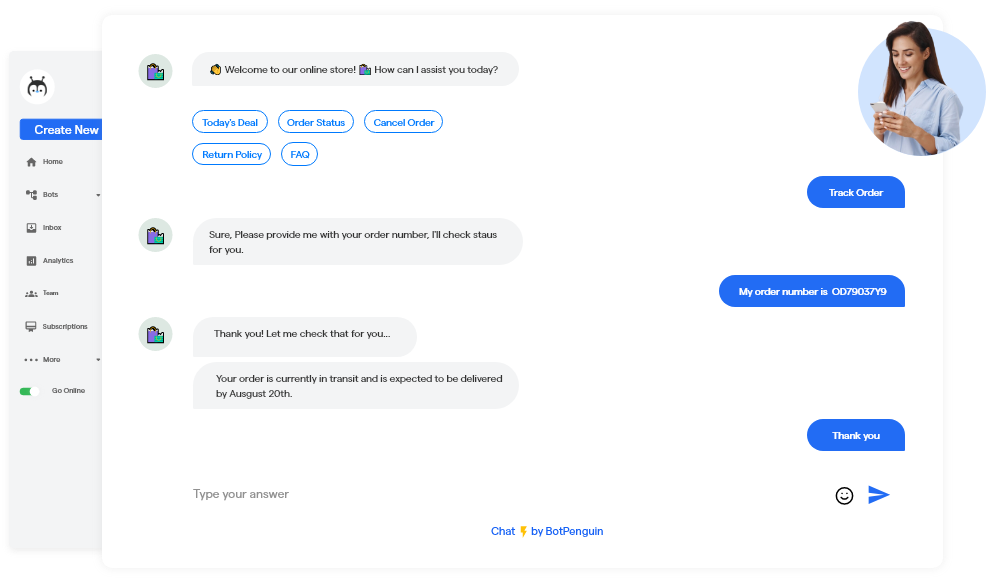Ever wondered how a whopping 91% customer retention rate is achieved? Accenture reveals that it boils down to companies offering tailored recommendations and enticing deals. Personalized customer experiences are now integral to commercial success.
Now, what if your resources are tight? This is where Natural Language Understanding (NLU) steps in. NLU, powered by artificial intelligence, allows businesses to train robots to understand human language. Neglecting NLU tools limits your capacity to deliver exceptional customer experiences, hindering business growth.
The sea is still teeming with fish: researchers discovered that more than 60% of consumers believe businesses should care more about them. Also, remember that 4.95 billion Internet users worldwide prefer and anticipate natural language understanding in their experience.
These facts testify to the importance of implementing NLU. So, let's delve more into its meaning and purpose.
Understanding NLU

NLU-powered chatbots enable organizations to converse with customers in an almost human-like natural language. This means businesses can provide quick and accurate responses to customer inquiries 24/7, improve average response time, and reduce customer dissatisfaction.
Explanation of NLU and its components
NLU or Natural Language Understanding, is a branch of natural language processing (NLP) that deals with human languages' computational understanding and processing.
NLU uses computer algorithms to understand human language in written or spoken form, including its meaning, context, and intent. NLU comprises several components, including
- Tokenization: This involves breaking up text or speech into individual units, such as words or phrases.
- Part-of-Speech Tagging: This involves analyzing the words in text or speech and identifying the parts of speech of each word, such as nouns, verbs, and adjectives.
- Named Entity Recognition: This involves identifying and classifying named entities in text or speech, such as persons, organizations, and locations.
- Sentiment Analysis: This involves determining the sentiment or emotional tone of text or speech, such as positive, negative, or neutral.
How NLU differs from Natural Language Processing (NLP)?
NLU and NLP are often used interchangeably, but they are different. NLP is a broader field that encompasses both written and spoken language processing.
NLP includes NLU and other subfields, such as machine translation, text summarization, and speech recognition.
NLU, on the other hand, focuses specifically on understanding the meaning and intent of human language.

Examples of NLU Applications
NLU has numerous applications in various industries. A few examples of NLU applications include:
- Chatbots: NLU is used to power chatbots, which can understand and respond to customer inquiries in natural language using text or speech.
- Virtual Assistants: NLU is used to develop virtual assistants, like Siri or Alexa, that can respond to voice commands and answer questions.
- Automatic Summarization: NLU can be used to summarize articles or documents automatically, saving time and enhancing efficiency.
- Sentiment Analysis: NLU can be used to analyze and understand customer sentiment to identify trends, concerns, and opportunities.
Benefits of NLU for Business

NLU offers several significant benefits for businesses. It enhances customer understanding, improves customer experiences, enables personalized marketing and recommendations, and facilitates efficient customer support through chatbots.
By leveraging NLU, businesses can stay competitive, build strong customer relationships, and drive growth by delivering excellent customer experiences.
Enhanced Customer Understanding
NLU is crucial in providing businesses with enhanced customer understanding.
By analyzing and interpreting customer language patterns, NLU enables businesses to gain valuable insights into customer preferences, needs, and behaviors.
Understanding customer language allows businesses to identify trends, sentiments, and intentions, which can be used to tailor products, services, and marketing strategies to better meet customer expectations.
NLU-powered sentiment analysis, for example, can help a business identify customer dissatisfaction or emerging trends to stay ahead of the competition.
Improved Customer Experiences

NLU has the potential to significantly improve customer experiences. By leveraging NLU, businesses can offer personalized and contextualized customer interactions.
For instance, NLU-powered chatbots or virtual assistants can engage in natural language conversations, providing relevant responses and resolving customer queries quickly and accurately.
This improves customer satisfaction by offering real-time support, reducing wait times, and ensuring consistent service quality across channels.
Suggested Reading:
Personalized Marketing and Recommendations
NLU enables businesses to deliver personalized marketing messages and recommendations based on customer language analysis.
Businesses can create targeted marketing campaigns that resonate with individual customers by understanding customer intents and preferences.
NLU can analyze customer feedback, social media posts, and other sources of customer language data to gain insights into customer preferences and interests. This allows businesses to deliver relevant offers, promotions, and product recommendations.
This personalized approach enhances customer engagement, increases conversion rates, and cultivates customer loyalty.
Efficient Customer Support and Chatbots

Another benefit of NLU is its ability to streamline customer support and automate interactions through chatbots.
NLU-powered chatbots can handle various customer inquiries, understand natural language queries, and provide accurate responses or route inquiries to the appropriate department.
This significantly reduces the need for human intervention, improves response times, and reduces operational costs.
With NLU, businesses can provide 24/7 customer support, handle multiple inquiries simultaneously, and ultimately enhance the overall customer support experience.
And if you are the one who likes the no coding chatbot building process, then meet BotPenguin, the home of chatbot solutions. With all the heavy work of chatbot development already done for you, simply use its drag and drop feature to build AI-powered chatbot for platforms like:
- WhatsApp Chatbot
- Facebook Chatbot
- WordPress Chatbot
- Telegram Chatbot
- Website Chatbot
- Squarespace Chatbot
- woocommerce Chatbot
- Instagram Chatbot
Implementing NLU in Your Business
Implementing NLU in your business involves a series of steps to ensure a successful integration. Here's an overview of the key steps involved:
Assessing Your Business Needs and Goals
Start by assessing your business needs and goals. Identify the areas in your business where NLU can bring the most value.
For example, you can improve customer support, automate repetitive tasks, or gain insights from customer feedback. Understanding your specific needs and goals will help guide the selection and implementation of NLU tools.
Exploring NLU tools and platforms available
Once you clearly understand your business needs, research and explore the various NLU tools and platforms available in the market.
Consider factors such as functionality, flexibility, scalability, and compatibility with your existing systems.
Some popular NLU tools and platforms include Dialogflow, Wit.ai, and IBM Watson. Evaluate each option based on your requirements and select the best fit for your business needs and budget.
Integration of NLU Into Existing Systems
To implement NLU effectively, it's important to integrate it seamlessly into your existing systems.
This involves connecting NLU tools with your customer relationship management (CRM) software, chatbots, virtual assistants, or other relevant systems.
Depending on the NLU tool you choose, APIs or libraries may be available to facilitate this integration. Ensuring NLU integrates smoothly and works seamlessly with your existing processes is essential to deliver the desired outcomes.
During the implementation process, involving relevant stakeholders in your organization is important.
IT teams, customer service departments, and marketing teams should collaborate to ensure a smooth integration and alignment with your business objectives.
Stakeholder involvement will help make informed decisions, address potential challenges, and maximize the benefits of NLU implementation.
Suggested Reading:
NLU Best Practices
For successful implementation and optimal performance of NLU, businesses should follow certain best practices. Here's an overview of the key practices:
Data quality and preprocessing
The quality of data used to train NLU models is critical in achieving accurate and effective results.
Therefore, verifying the quality of the data used for training NLU models and preprocessing it appropriately is essential.
Preprocessing techniques such as data cleaning, normalization, and disambiguation can minimize noise and increase the accuracy of NLU models.
Continual training and updates
NLU technology is improving rapidly, and new developments can significantly enhance the accuracy of NLU models.
Therefore, retraining and updating NLU models is crucial to maintaining optimal performance and accuracy.
Updating NLU models will help ensure that customer interactions are understood and assessed accurately and responses are tailored appropriately.
Ethical Considerations and Privacy Concerns
Using NLU raises ethical concerns and privacy issues. Businesses must ensure that their use of NLU complies with ethical and legal standards and is transparent with their customers about how their data is used.
Furthermore, it is crucial to ensure that NLU models are not biased and respect diversity, equity, and inclusion.
Businesses must also enforce privacy laws and regulations and take appropriate steps to protect any sensitive data used in training NLU models.
Future of NLU in Business
The future of NLU in business holds exciting potential advancements and trends. Here's an overview of what we can expect:
Advanced Context Understanding
NLU technology is expected to advance its ability to understand context more deeply. This means NLU models will be able to comprehend complex language nuances, idioms, and even emotions better.
This advancement will enable businesses to provide more personalized and accurate responses to customer inquiries, improving customer satisfaction.
Multilingual and Cross-lingual NLU
With globalization and businesses operating in multiple countries, multilingual and cross-lingual NLU will become increasingly important.
NLU models will process and comprehend multiple languages efficiently, enabling businesses to engage with customers from diverse linguistic backgrounds and expand their reach to new markets.
Integration With Voice Assistants and Smart Devices
As voice assistants and smart devices become more prevalent, NLU technology will also evolve to integrate with these platforms seamlessly.
NLU models will be able to understand and respond to voice commands, making interactions more natural and intuitive.
This integration will open up new business opportunities to provide voice-based customer support, personalized recommendations, and even conduct transactions through voice interfaces.
Improved Knowledge Graphs and Information Retrieval
NLU technology will continue to improve its ability to access vast amounts of information quickly and accurately.
This will enable businesses to build more comprehensive knowledge graphs and enhance information retrieval capabilities.
With better access to relevant information, businesses can provide more accurate and valuable responses to customer inquiries.
Conclusion
NLU has evolved from a luxury to a crucial tool, especially for businesses prioritizing customer support quality and deriving insights from textual data.
Numerous companies have adopted NLU technologies to analyze human input and gain actionable insights.
The market is expected to grow significantly, reaching over $43 billion by 2025, making NLU implementation a competitive necessity.
While off-the-shelf NLP and NLU solutions abound, finding one tailored to specific business needs can be challenging.
Ready-made solutions often come with unnecessary pre-built features, and selecting the right solution and partner without a solid knowledge of natural language processing can be daunting.
These factors impact the outcomes of an NLU solution.
Unlock BotPenguin's full potential with our conversational AI platform. Easily create intelligent chatbots using advanced NLU techniques.
Build virtual agents that truly understand language nuances, going beyond keywords. Deploy NLU across sales, support, and operations for next-level automation and human-like engagement.
Businesses trust BotPenguin for NLU-driven growth. Our end-to-end solution simplifies language AI for any business.
Don't let complexity hold you back. With expert guidance, cutting-edge technology, and flexible NLU integration, redefine what's possible. Join the NLU revolution and become an industry trailblazer!
The future is conversational, and BotPenguin, with NLU capabilities, helps you maximize satisfaction and ROI. Let's unlock it together!
Suggested Reading:
Frequently Asked Questions (FAQs)
How can businesses leverage NLU to enhance customer experiences?
Businesses can use NLU to understand customer intent, provide personalized responses, and automate customer support, improving customer experiences and satisfaction.
What are the operational benefits of implementing NLU in business processes?
Implementing NLU can increase operational efficiency by automating tasks, reducing response times, and freeing human agents to focus on more complex or high-value tasks.
How can NLU provide valuable insights for business decision-making?
NLU enables businesses to analyze customer interactions, uncovering insights about customer preferences, pain points, and trends. These insights can inform product refinement, marketing strategies, and more.
How can NLU be integrated into multilingual customer support?
NLU's multilingual capabilities allow businesses to engage with customers from diverse linguistic backgrounds, breaking language barriers and expanding market reach.
What are the key considerations for implementing NLU in business strategies?
Successful implementation of NLU requires careful planning, data quality, continuous training, and adherence to ethical considerations such as data privacy and security.
How can businesses measure the effectiveness of NLU implementation?
Businesses can measure the effectiveness of NLU implementation by evaluating customer satisfaction metrics, response times, and task automation rates and analyzing feedback from customers and team members.

